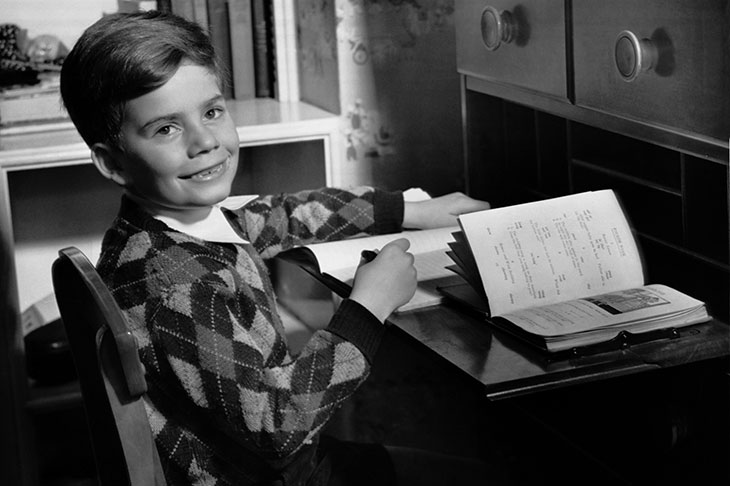I never meant to conduct a social experiment. I never intended to undermine anyone’s confidence in their judgement. And I certainly never meant to arouse so much hostility. Yet by choosing to home-school my six-year-old this is precisely what I seemed to be doing.
Like many other desperate parents, I hadn’t got our first choice of primary state school (this year, just 68 per cent of parents in our Local Education Authority, Kensington and Chelsea, did). In fact, the only place for Izzy was at a primary across the river, which would take over an hour of travelling to get to.
So I decided to teach Izzy at home. To be more precise, I decided that my mother, then 72, would teach her. I would merely ferry the child to my mother’s flat, and provide textbooks and online courses.
A long tube and bus trip to some unknown school in an unfamiliar neighbourhood or a 20-minute walk to a beloved granny’s — the choice was easy. Less so was putting up with the criticisms. Other parents felt compelled to pass judgment: you are robbing your daughter of precious peer-to-peer interactions; you think you’re too good for our school system; you think she’s cleverer than my children; you’re storing up trouble, because she will grow into a fragile and precious mini-monster.
Happily, I didn’t have to bear these attacks for very long. Shortly after we began home-schooling we stumbled upon a fabulous state school near our home where, miraculously, a place had materialised.
But that brief (three-month) experience left me thinking that home-schooling has been unfairly maligned. For centuries our forefathers learned at home. Home education was the norm, from Aristotle who tutored Alexander the Great, through to Thomas Hobbes who tutored the Earl of Devonshire, and the succession of tutors who educated our kings and queens until the 20th century. Recent headlines, however, have focused on religious fanatics who want to keep their children from the temptations of modernity. Unregistered and unmonitored, home-educated children can slip under the radar. And, the thinking goes, no one can be sure of what happens to them then: they are as likely to be encouraged to hold hateful views as to flourish intellectually and creatively.
Although school attendance is not a legal requirement, the government, too, is clearly wary of those who opt out. Lord Soley has introduced an education bill to call for all home schools to be registered, monitored and inspected.
And yet. Home-schooling puts parents in charge of their child’s upbringing. Isn’t parental responsibility something to promote rather than punish? Ask any headteacher in a deprived area and they’ll tell you how five-year-olds come into reception in nappies, unable to hold a spoon or to sit still. Parents who abrogate all responsibility are the problem, not those who want to deliver the best education to their children and are prepared to do it themselves.
A growing number of parents agree. Over the past three years, the number of home-educated children in the UK has increased by 40 per cent, to 48,000. Many of these are middle-class parents seeking some control over their children’s upbringing. They don’t want to hand over their precious child to a sink school just because the LEA can’t cope with the numbers; they don’t like the pressure and stress that cast their shadows over many private schools; or they simply want to offer their children a wider range of inputs and influences.
Parental choice fuels the drive towards home-schooling. Lucy Johnson, a west London psychotherapist who specialises in women’s issues, says that in her experience, mothers regard their children’s education as all-important, and not an area where they are prepared to be passive. ‘In my clinical work, I’m finding that women are more determined to seize control of their choices in all areas of their lives, and for mothers that includes their children’s schooling.’
These parents are investing serious money in home-tutoring, which has become a £100 billion industry, with some firms charging parents more than £1,000 a week for high-level graduates to mentor their children.
Nathaniel McCullagh, Founder of Simply Learning Tuition, believes that lifestyle choices ‘play a large part in the decision to home-school. Families who are travelling for work or leisure, or relocating, need a continuity of education that school can’t provide but a tutor or team of tutors can’.
Mental health issues also loom large in parental choice. This shouldn’t come as a surprise, given that the latest statistics show one in ten children is experiencing some kind of mental health problem, while almost a quarter of teenage girls exhibit depressive symptoms. It doesn’t help that social media amplifies the competition over looks, exam results, popularity that’s part of growing up — creating a suffocating, 24/7 pressure-cooker environment.
Will Orr-Ewing has been running Keystone Tutors since 2006. His tutors can’t keep social media at bay, but ‘the one-on-one teaching allows them to cater for the child’s specific needs and strengths. Our tutors can rekindle a child’s enthusiasm for any subject. Some parents feel strongly that their child is not getting the basics they themselves were taught at school — whether it is the great classics or Bible stories. They are tremendously grateful that we can fill that gap.’
They must also be glad that, outside the classroom and beyond the rules and regulations of the education system, their home-schooled children have had to develop into self-starters and independent thinkers. These qualities will see them through in the changing world of work, which has grown more uncertain and unsettled. Home education has had a bad press. Soon that may change, too.






Comments